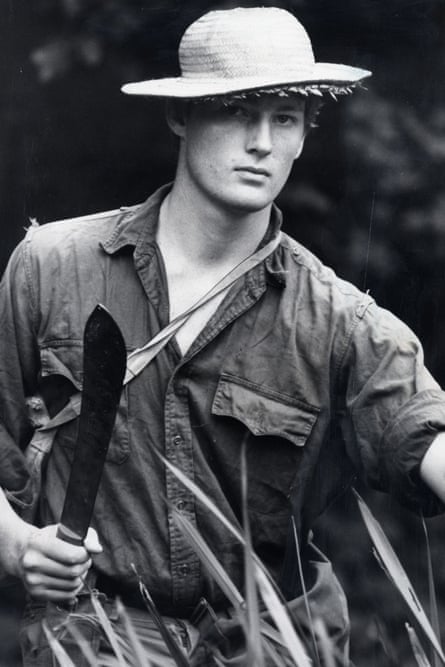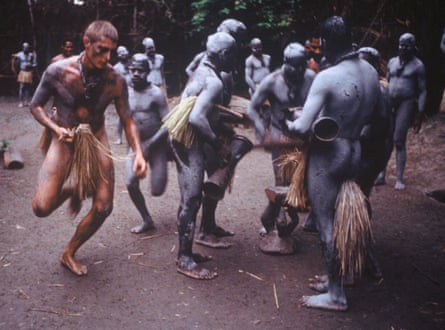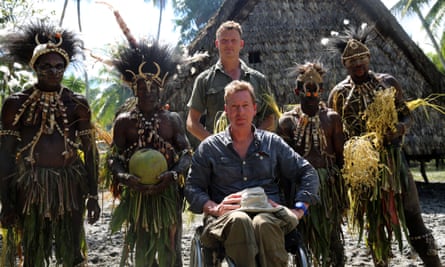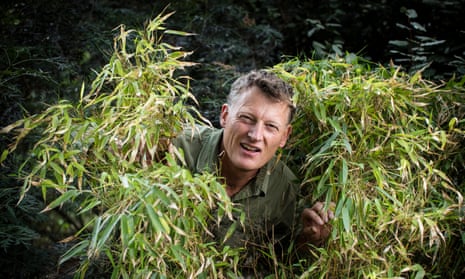Benedict Allen arrives dressed like an explorer: all in green, multi-pocketed jacket, sturdy trousers, a bag that could carry accessories in the Amazon. It is a somewhat anachronistic get-up for a meeting in central London, at the Savoy hotel, but very useful given that we want a picture of him in the gardens next to the Embankment, which, for our purposes, will double as a jungle.
He takes the artifice like a trouper, pushing aside the ferns as if he was yomping to a lost city in Amazonia, but proves less adept once we are seated in the hotel, having difficulty making clear just how large a pot of tea he wants and turning away the nuts and olives because he doesn’t realise they are complimentary. “Sorry, I’m not your usual class of guest,” he says to the bemused waitress. After spending so much of his life in wildernesses, he admits he finds it difficult adapting to this more refined jungle, but it may also be a natural trait: tall, gangly and prone to gesticulating wildly to express himself, he was not made for sipping tea in hotel bars. He was made for a life of adventure.
His problem is that the great adventure he had last autumn – a trip back to his old stamping ground of Papua New Guinea – ended in near-disaster. He was trying to make contact with the Yaifo – a tribe with whom he had lived 30 years ago. He became stranded, his route back blocked by fighting between rival groups, contracted malaria and dengue fever, and sent out an appeal for help via his agent. Unfortunately, the appeal was answered by the Daily Mail, which sent a helicopter. The Mail claimed he had been rescued from certain death at the hands of headhunters, while all the rival papers also trying to reach him claimed either that he was never in danger or that the whole thing was a hoax designed to propel him back into the news after a career dip.
Eight months on from the debacle, Allen has recovered his equilibrium. He is bronzed, still very good-looking at 58, unapologetic – he was widely portrayed, not least in the Guardian, as an old-style public school adventurer who deserved everything he got. Now he is on a new one-man expedition to the Peruvian Amazon, and has an autumn theatre tour in which he will talk about his exploits. He has also just signed a contract with the publisher Canongate for a memoir (working title: A Dangerous Yearning) that will analyse what made him start exploring – if we can still use that term in the age of GPS – in the first place. You get the sense he is quite eager to discover the answer to that question himself.

“I was very earnest, an angry young man,” he says when I ask him why he set out on his first expedition to the Amazon in his early 20s. “I was very driven and dying to get on with things. I’ve never understood that, except my dad was a test pilot and seeing him flying the Vulcan bomber overhead as an impressionable little boy was the most amazing thing. It made me believe it was possible to be an explorer. I began fossil collecting and converted the tool shed into a museum for fossils. I was a bit of a loner perhaps, a bit of a dreamer at the beginning.”
He went to Bradfield College, a public school in Berkshire, then studied environmental science at the University of East Anglia, and started a degree in ecology at Aberdeen. But he packed in the latter to go to the Amazon on a one-man expedition that became the basis of his first book, Mad White Giant. “I just couldn’t contain myself any longer,” he says. “I was incredibly restless. I was pacing about, I put leaves on my floor in my little bedsit in Aberdeen, I had maps all over the wall, I just wanted to get out and get on with it.”
The restlessness is clear – listen to those short sentences, fired out in rapid gasps that sometimes trail off into nothingness. But giving up on science made him an easy target for environmentalists who say he is an amateur who does more harm than good. At the time of last year’s fiasco in Papua New Guinea, the Guardian unearthed an anthropologist who did not mince his words about Allen. “Why should we care about a lost, unprepared, silly, white, privileged, male middle-aged fool?” said Denis Crowdy, an ethnomusicologist based at Macquarie University in Sydney and an expert on Papua New Guinea, adding for good measure that Allen was a “square-jawed Boy’s Own adventurer”.
“Is my jaw square?” says Allen, stroking his chin, when I put Dr Crowdy’s comments to him. “I don’t want to get into a fight about it. I did a degree in environmental science that included anthropology and archaeology, so I’m a scientist by training and I’m as curious as any other scientist. My early work Into the Crocodile Nest – documenting a male initiation rite that I studiously described, indeed went through – was regarded as a good example of what is called in cultural anthropology ‘participant observation’.”
The question at the heart of these arguments is what now constitutes exploration. Some critics see it as inherently imperialist, and Allen as a Victorian throwback. He rejects the criticism. “I’ve railed against imperialism in exploration,” he says. “I ended my TV series The Skeleton Coast by saying that, for me, exploration is not about planting flags, it’s not about going somewhere to conquer it or make your mark, it’s about the opposite. You have to open yourself up, allow yourself to be vulnerable and let the place make its mark on you. My technique is about immersion, seeing people eye to eye, face to face, not bringing in phones and gadgets and saying I can be rescued at any time. By putting my faith and my life in the hands of the local people, I’m sending out a very simple message – we’re all in this together.”

Is it possible now to even call yourself an explorer? The Wikipedia entry on him prefers “adventurer”. “The great land journeys have been done. I was very lucky to be part of that at the end – walking up the Skeleton Coast [in Namibia] – but this was the end of that era and exploration now has to be redefined. We are all explorers as humans, so maybe it’s taking back the term. Stanley [the Victorian journalist famous for his journeys in Africa] wouldn’t have been called an explorer; he was called a traveller. He was bringing back a picture of Africa for Europe, which didn’t know Africa. The Africans knew Africa, the Arabs knew Africa – they had this great span of knowledge from west coast to east coast. So all Stanley was doing was bringing back a contemporary picture, and that’s what we need to keep doing.”
In Allen’s definition, anyone with curiosity can be an explorer – that will be the theme of his stage shows, in which he wants to tell the young they can still dream. “People told me time and time again when I was a child: ‘It’s over, Benedict, it’s over. You can want to be a lovely romantic hero all you want, but it’s over.’ I said: ‘I don’t want to be a lovely romantic hero, I just want to get out there and discover the world.’ The natural world is under threat, habitats are being degraded, and we need to understand it more urgently than ever. I want young people to think there still can be explorers. How sad is it if the world has all been explored? And, anyway, it isn’t true. We know the surface of Mars better than we know the ocean floor.”
Allen’s life has so far consisted of two acts: expeditions in his 20s and 30s, which he turned into books and self-filmed TV series; and the period since 2000 (when he turned 40) in which he has concentrated mainly on writing, including an unpublished novel set in the Congo. He can pinpoint the moment when the curtain came down on the first act: “I was in the Arctic and briefly separated from my dog team and sledge trying to cross the Bering Strait, and I decided enough was enough. My mum had already died; it was just my dad at home, heartbroken, and I felt, ‘I’ve been lucky getting away with it all these years.’ So, when I found my dogs, I turned my sledge around, came back and said: ‘No more.’”
Television was, in any case, finding new explorer/survivor heroes such as Ray Mears and Bear Grylls, who travelled with film crews and put the emphasis on drama rather than immersion. “I was never a TV presenter,” says Allen. “I was a writer and traveller. I had this wonderful time in the 90s when I was allowed to take a camera, do my expeditions and film whatever happened, and it was great. But that was no longer good enough for the telly world; people were not excited any more by this idea of someone self-filming, which is something I’d pioneered. Anything with a film crew has to be prearranged. I felt my time was over. I was very grateful and thought, ‘Now I’ll settle down and do some decent writing.’”

He edited his exploration anthology, embarked on a novel, gave talks, and really did settle down, marrying, having three children and living in suburban bliss in Twickenham – about as far from the Amazon as one can imagine. Now, though, he faces Act III. Making a programme with BBC journalist Frank Gardner a couple of years ago, in which the two of them set off for Papua New Guinea in search of the bird of paradise, got the old juices flowing again. “I suppose I got back a bit of my spark,” he says. “I wouldn’t say I was depressed …” The sentence trails off, but the meaning is clear. That new life, the shed at the end of the suburban garden in which he wrote, had begun to pall. The expedition with Gardner was followed by the quest last year that ended in disaster and now a further trip to the Amazon, bookending his journeys 30 years ago and giving him material for a book he hopes will make sense of his wanderings.
The house in Twickenham is now let – useful income for Allen, who insists he is not wealthy; his Czech-born wife, Lenka, and their three children are living in Prague, and he commutes between there and London. The tension between family man and restless explorer/adventurer/searcher after some unpindownable truth is evident. I ask him if he will still be exploring after the age of 60. “I think, in my own way, I will be,” he says. “There’s a certain urgency you feel as you get older. You feel time’s running out. I’m more conscious than ever, having been very ill recently, that I’ve got to get out there.” But then he admits “this might be the last big one” and that he doesn’t “think strategically”. Act III could be tortuous, the denouement far from settled.
Benedict Allen’s Ultimate Explorer tour begins at the Union Chapel, London, on 22 September.

Comments (…)
Sign in or create your Guardian account to join the discussion